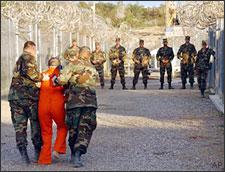Advertisement
Closing Guantanamo
Resume
The images are seared in the mind of the world, from the earliest days of George W. Bush's war on terror. Hooded prisoners, black goggles, orange jump suits, in chains, in chain-link cages at Guantanamo.
The White House called them the “worst of the worst.” And some were. But most, apparently, were not. Hundreds have been released. Human rights and torture accusations swirled.
Today, word is coming from Barack Obama’s administration that the detention camp at Guantanamo — “Gitmo” — will be closed, shut down, along with a shadowy global network of CIA secret prisons. Also to be ended: the interrogation methods that brought charges of torture.
Gitmo became a symbol of American rage. Closing it is complicated. This hour, On Point: Shutting down Guantanamo.
You can join the conversation. Is this a weight off your shoulders? A step toward getting right with the world? With the law? Is it a danger? A worry? Share your thoughts.Guests:
From Charlottesville, Virginia, we're joined by Dahlia Lithwick, senior editor and legal analyst for Slate.
And from Guantanamo Bay, Cuba, we're joined by Carol Rosenberg, reporter for the Miami Herald covering Guantanamo and Camp X-Ray. She reports today on Obama's move to close Guantanamo.
From Washington, we're joined by Major David Frakt, Air Force Reserves judge advocate and defense counsel in the Pentagon’s Office of Military Commissions. He is representing Guantanamo detainees Mohamed Jawad and Ali al Bahlul. He is also Director of the Criminal Law Practice Center and professor of law at Western State University.
Joining us from New York is Matthew Waxman, professor of law at Columbia University. He held several positions in the Bush administration, including deputy assistant secretary of defense for detainee affairs, special assistant to National Security Advisor Condoleezza Rice, director for contingency planning & international justice at the National Security Council, and principal deputy director of policy planning at the State Department.
This program aired on January 22, 2009.